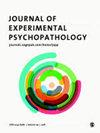A randomized controlled trial of Internet-delivered CBT and attention bias modification for early intervention of depression
IF 1.9
4区 医学
Q4 PSYCHIATRY
引用次数: 10
Abstract
The conceptualization and empirical knowledge base related to major depression has increased dramatically in recent years. We now have well-developed and validated models of depression from a range of theoretical perspectives. These models have significantly enhanced the development of effective treatments and preventative interventions. Although various prevention programs are available, Web-based protocols can enhance accessibility to evidence-based prevention programs. The current study involved a randomized controlled trial focused on the prevention and treatment of depression in high-risk first- and second-year undergraduate students. Three Internet-delivered preventative programs were compared: cognitive behavioral therapy (CBT; MoodGym), attentional bias modification, and an active attentional control condition. Participants (n = 350) completed symptom measurement pre- and post-intervention (6 weeks) and again at a 4-month follow-up, when they were also administered a structured diagnostic interview. Participants in the CBT condition showed more dramatic and continuous depressive symptom improvement between baseline and follow-up than did participants in the other two conditions. In addition, significantly fewer individuals in CBT condition met diagnostic criteria for major depression at follow-up than in the other conditions. These findings have important implications for future early intervention research and practice.网络认知行为治疗和注意偏倚修正对抑郁症早期干预的随机对照试验
近年来,与严重抑郁症相关的概念化和经验知识库急剧增加。我们现在有了从一系列理论角度发展和验证的抑郁症模型。这些模式大大促进了有效治疗和预防干预措施的发展。尽管有各种预防方案,但基于网络的协议可以提高循证预防方案的可访问性。目前的研究涉及一项随机对照试验,重点是高危一年级和二年级本科生抑郁症的预防和治疗。比较了三种互联网提供的预防方案:认知行为疗法(CBT;MoodGym)、注意偏差修正和主动注意控制条件。参与者(n=350)在干预前和干预后(6周)完成了症状测量,并在4个月的随访中再次完成,当时他们还接受了结构化诊断访谈。与其他两种情况下的参与者相比,CBT条件下的参与者在基线和随访期间表现出更显著和持续的抑郁症状改善。此外,在随访中,符合严重抑郁症诊断标准的CBT患者明显少于其他患者。这些发现对未来的早期干预研究和实践具有重要意义。
本文章由计算机程序翻译,如有差异,请以英文原文为准。
求助全文
约1分钟内获得全文
求助全文
来源期刊

Journal of Experimental Psychopathology
Medicine-Psychiatry and Mental Health
CiteScore
2.00
自引率
0.00%
发文量
19
审稿时长
11 weeks
期刊介绍:
The Journal of Experimental Psychopathology (EPP) is an open access, peer reviewed, journal focused on publishing cutting-edge original contributions to scientific knowledge in the general area of psychopathology. Although there will be an emphasis on publishing research which has adopted an experimental approach to describing and understanding psychopathology, the journal will also welcome submissions that make significant contributions to knowledge using other empirical methods such as correlational designs, meta-analyses, epidemiological and prospective approaches, and single-case experiments.
 求助内容:
求助内容: 应助结果提醒方式:
应助结果提醒方式:


